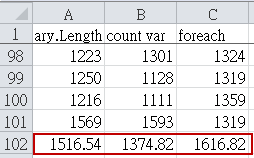迴圈比對條件的陣列長度該不該用變數?
| | | 4 | |
前幾天看到關於陣列跑迴圈時,比對條件裡陣列長度改用變數提升執行效率的討論。亦即
for (int i = 0; i < array.Length; i++) ...
若改成
int c = array.Length;
for (int i = 0; i < c; i++) ...
會不會變快?
支持變快的理由是比對條件會反覆執行,array.Length透過屬性取值會比直接存取變數耗時。
但有另一派說法:
Some programmers believe that they can get a speed boost by moving the length calculation out and saving it to a temp, as in the example on the right.
The truth is, optimizations like this haven't been helpful for nearly 10 years: modern compilers are more than capable of performing this optimization for you. In fact, sometimes things like this can actually hurt performance. In the example above, a compiler would probably check to see that the length of myArray is constant, and insert a constant in the comparison of the for loop. But the code on the right might trick the compiler into thinking that this value must be stored in a register, since
lis live throughout the loop. The bottom line is: write the code that's the most readable and that makes the most sense. It's not going to help to try to outthink the compiler, and sometimes it can hurt.
意思是,當代編譯器早非吳下阿蒙,面對這種情境能判斷array.Length不會變,JIT產生的執行碼在比對條件時會直接用常數;刻意改用變數,編譯器反而被誤道以為其值可能變化而改用Regiter儲存,效率反而較差。
兩派主張都有道理,那就實測看看好了。
寫了一支簡單測試程式,宣告一個由65535個int組成的陣列,分別存入0到65534,使用迴圈進行累加,因累加一輪時間太短,連續跑5000回合做為計時單位,等同執行約32憶次迴圈所耗時間。分別用for迴圈+array.Length、for迴圈+長度變數、foreach三種做法各測一次,另外怕只測一次數據會受其他因素干擾失真,故三種測試都跑100次求平均減少誤差。
using System; using System.Collections.Generic; using System.Diagnostics; using System.IO; using System.Linq; using System.Text; namespace TestLoop { class Program { static void Main(string[] args)
{ int[] ary = new int[65535];
for (int i = 0; i < ary.Length; i++)
ary[i] = i;
int TIMES = 5000; long sum = 0; Stopwatch sw = new Stopwatch(); StringBuilder sb = new StringBuilder(); sb.AppendLine("ary.Length,count var,foreach"); for (int run = 0; run < 100; run++)
{ sw.Reset();
sw.Start();
for (int t = 0; t < TIMES; t++)
{ sum = 0;
//比對i < ary.length for (int i = 0; i < ary.Length; i++)
{ sum += ary[i];
}
}
sw.Stop();
Console.WriteLine("{1} ary.Length = {0:N0}ms", sw.ElapsedMilliseconds, sum);
sb.Append(sw.ElapsedMilliseconds + ","); sw.Reset();
sw.Start();
for (int t = 0; t < TIMES; t++)
{ int count = ary.Length; sum = 0;
//將ary.Length存入count變數比對 for (int i = 0; i < count; i++)
{ sum += ary[i];
}
}
sw.Stop();
Console.WriteLine("{1} count variable = {0:N0}ms", sw.ElapsedMilliseconds, sum);
sb.Append(sw.ElapsedMilliseconds + ","); sw.Reset();
sw.Start();
for (int t = 0; t < TIMES; t++)
{ sum = 0;
//使用foreach foreach (int n in ary)
{ sum += n;
}
}
sw.Stop();
Console.WriteLine("{1} foreach = {0:N0}ms", sw.ElapsedMilliseconds, sum);
sb.AppendLine(sw.ElapsedMilliseconds.ToString());
}
File.WriteAllText("d:\\result.csv", sb.ToString()); Console.Read();
}
}
}
由執行結果來看,三種做法各有勝負,並未出現一面倒:
2147385345 ary.Length = 1,274ms 2147385345 count variable = 1,260ms 2147385345 foreach = 1,701ms //foreach > Length > 變數 2147385345 ary.Length = 1,805ms 2147385345 count variable = 1,472ms 2147385345 foreach = 2,151ms //foreach > Length > 變數 2147385345 ary.Length = 1,266ms 2147385345 count variable = 1,238ms 2147385345 foreach = 1,621ms //foreach > Length > 變數 2147385345 ary.Length = 1,623ms 2147385345 count variable = 1,658ms 2147385345 foreach = 1,298ms //變數 > Length > foreach 2147385345 ary.Length = 1,214ms 2147385345 count variable = 1,271ms 2147385345 foreach = 1,310ms //foreach > 變數 > Length 2147385345 ary.Length = 1,358ms 2147385345 count variable = 1,125ms 2147385345 foreach = 1,404ms //foreach > Length > 變數 2147385345 ary.Length = 1,421ms 2147385345 count variable = 1,471ms 2147385345 foreach = 1,432ms //變數 > foreach > Length 2147385345 ary.Length = 1,801ms 2147385345 count variable = 1,475ms 2147385345 foreach = 1,848ms //foreach > Length > 變數 2147385345 ary.Length = 1,608ms 2147385345 count variable = 1,527ms 2147385345 foreach = 1,587ms //Length > foreach > 變數 2147385345 ary.Length = 1,554ms 2147385345 count variable = 1,392ms 2147385345 foreach = 2,057ms //foreach > Length > 變數
...略...
然而,約略感覺將array.Length存成變數的做法領先次數較多,100次測試時間取平均值也印證了這點,for+count變數最快,其次是for+ary.Length,foreach最慢! (下圖紅框為100次測試的耗時平均值)

【結論】
雖然由平均值來看,將陣列長度存成變數的時間最短,但是30億次只差0.14秒,且執行期間很可能因其他因素逆轉結果(由反覆測試時三種方法各有勝負得知,甚至確知較複雜的foreach寫法也可能最快)。
故用.NET程式寫陣列迴圈時,不必庸人自擾去求這"奈米級"的差別,用最直覺、易讀的方式撰寫更重要。我會選擇直接用Array.Length,甚至用foreach也無妨,程式碼易理解就好。
Comments
# by Puritys
使用變數還是比較好一點,畢竟不同的程式語言 & Compiler 會有不同的編譯方式。
# by Nye
[舉手] "宣告一個由65535個int組成的陣列,分別存入0到65535" 這樣不是有 63336 個才對?
# by Nye
我自己也打錯... 65536
# by Jeffrey
to Nye, 哈! 謝謝指正。文章說明處改為"存入0到65534"以便與程式碼相符。